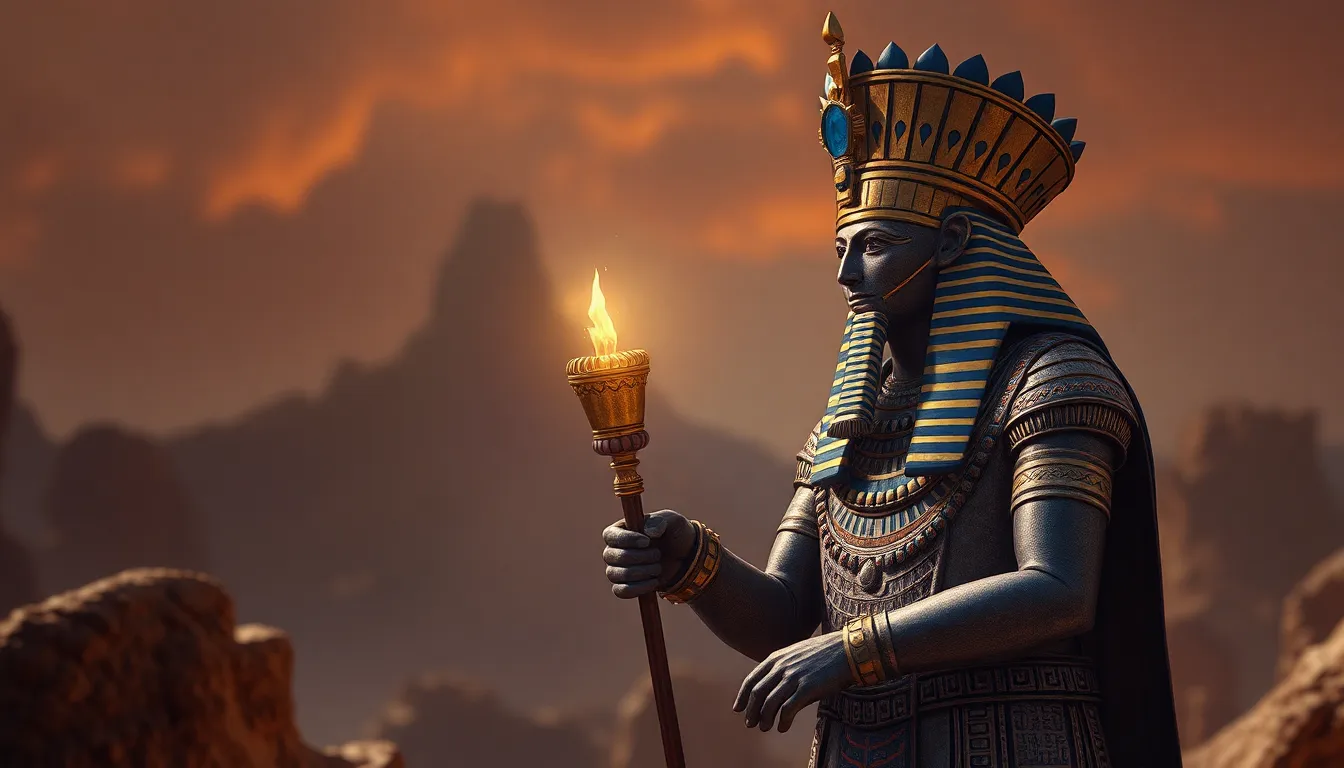The Role of the God Thoth in Egyptian Mythology
I. Introduction
Egyptian mythology is a rich tapestry of beliefs, stories, and rituals that shaped the ancient civilization of Egypt. Central to this mythology is a pantheon of deities, each with distinct roles and attributes. Among these deities is Thoth, a god revered for his wisdom, knowledge, and association with writing and magic. Thoth’s significance in ancient Egyptian culture cannot be overstated, as he served as a mediator between the divine and human realms, guiding the souls of the deceased and imparting knowledge to humanity.
II. Thoth’s Origins and Birth
The origins of Thoth are steeped in myth and symbolism. According to various accounts, Thoth was either self-created or born from the mind of the sun god Ra. He is often depicted as emerging from the primordial waters of Nun, representing the chaos before creation. Thoth’s parentage varies, with some versions stating he is the son of the moon goddess Iah and the sun god Ra, while others suggest he is a child of Sekhmet or Hathor.
The symbolism of Thoth’s birth relates closely to Egyptian cosmology, embodying the principles of order and knowledge that emerged from chaos. His existence represents the balance of dualities, such as night and day, male and female, and life and death.
III. Attributes and Symbols Associated with Thoth
Thoth is often depicted in art and hieroglyphics as a man with the head of an ibis or sometimes as a baboon. His appearance is symbolic of his attributes:
- Ibis Head: The ibis is associated with wisdom and knowledge, reflecting Thoth’s role as a scribe and a keeper of wisdom.
- Writing Tools: Thoth is frequently shown holding a stylus and a palette, symbolizing his invention of writing and his role as a scribe of the gods.
- Lunar Associations: As a god associated with the moon, Thoth embodies the cyclical nature of time, knowledge, and enlightenment.
Each of these symbols carries profound meanings, suggesting the dual nature of Thoth as both a creator and a preserver of knowledge, as well as an arbiter of cosmic order.
IV. Thoth as the God of Wisdom and Knowledge
Thoth’s primary role in Egyptian mythology is that of the god of wisdom and knowledge. He is credited with imparting knowledge to humanity, teaching them the arts of writing, science, and magic. His influence can be seen in various aspects of ancient Egyptian life:
- Writing: Thoth is believed to have invented hieroglyphics, providing a means for humans to communicate and record their history.
- Science: He is associated with various fields of study, including astronomy, medicine, and mathematics, guiding scholars and practitioners.
- Magic: Thoth is seen as a master of magic, imparting esoteric knowledge and rituals that were crucial for religious and everyday life.
His influence on education and literacy was profound, as texts attributed to him were revered in temples, ensuring the continuity of knowledge throughout generations.
V. Thoth’s Role in the Afterlife and Judgment
Thoth plays a pivotal role in the afterlife, particularly in the judgment of souls. In the Hall of Ma’at, he is depicted as the scribe who records the results of the weighing of the heart ceremony, a crucial event in the journey of the deceased. During this ceremony:
- The heart of the deceased is weighed against the feather of Ma’at, symbolizing truth and justice.
- If the heart is lighter than the feather, the soul is deemed worthy and granted passage to the afterlife.
- If heavier, the soul faces annihilation at the jaws of Ammit, a fearsome creature that devours the unworthy.
Thoth’s presence as the recorder of fate underscores his importance in the afterlife, signifying his role as a guardian of truth and justice.
VI. Thoth in Egyptian Literature and Texts
Thoth appears frequently in various ancient Egyptian texts, such as the Book of the Dead, where he is invoked for protection and guidance in the afterlife. His role in myths and stories is also significant, often depicted as a counselor to other gods or as an arbiter in disputes.
Notable references include:
- The Contendings of Horus and Set, where Thoth mediates between the two gods.
- Texts that describe the creation of humanity, where Thoth provides the knowledge necessary for civilization.
His portrayal in these texts illustrates his multifaceted nature, embodying wisdom, justice, and the divine order of the universe.
VII. The Influence of Thoth on Later Cultures
The impact of Thoth extended beyond ancient Egyptian civilization, influencing Greco-Roman interpretations of Egyptian mythology. The Greeks identified Thoth with their god Hermes, associating him with communication, writing, and magic.
In modern times, Thoth has found representation in literature and popular culture, often depicted as a symbol of wisdom and knowledge. His legacy continues in contemporary spiritual practices, where he is invoked in rituals related to writing, learning, and the pursuit of knowledge.
VIII. Conclusion
Thoth’s multifaceted roles in Egyptian mythology highlight his significance as a deity of wisdom, knowledge, and justice. His contributions to writing, science, and the afterlife reflect the values of ancient Egyptian society, emphasizing the importance of knowledge and the moral order of the universe.
Understanding Thoth provides valuable insights into ancient Egyptian beliefs, showcasing the complexity of their mythology and its relevance to human experience. The enduring legacy of Thoth serves as a reminder of the timeless quest for knowledge and truth in our lives.




